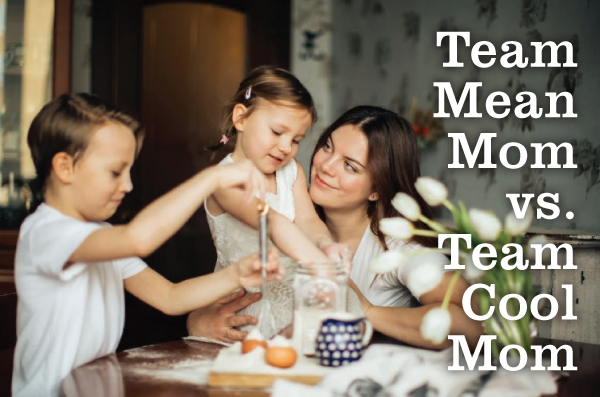
Recently my daughter and I rewatched a Netflix rendition of a popular YA novel from a few years ago. The story’s main character has two potential love interests, and teens disagree about whom she should choose, referring to themselves as Team Guy 1 or Team Guy 2. We laughed, weighing the pros and cons of both.
In parenting we often feel there are two camps to choose from: authoritarian parenting versus permissive parenting, strict vs. indulgent. But neither of these styles is ideal in isolation.
You may have seen the T-shirts and memes, but neither “Team Mean Mom” or “Team Cool Mom” is a great model. Every child needs parents invested in their personal growth, who love them unconditionally and work to build a relationship with them.
What defines “mean moms” vs. “cool moms”? The mean mom meme (say that 10 times fast) generally list ways parents earn the insult “mean” from their child. In essence, “mean moms” set and enforce limits, aren’t afraid to say “no” and insist children follow the rules. Their number one priority appears to be discipline and respect for the rules. They believe conflict with their child is less detrimental to their growth than allowing overly indulgent behavior.
“Cool moms” or “friend moms” are the easygoing, whatever-makes-you-happy type model, who pick their battles, only insisting on a few rules they feel strongly about. Sometimes even these are up for debate, depending on the circumstances. Having a positive relationship with their child appears to be their number one priority. They choose having fun and positive feelings over conflict every time.
Both parenting strategies have some appeal, some value and some detriment.
We all want a good relationship with our children and for them to obey the rules. But in the parenting trenches, when our child is pitching a horrific fit in Walmart, on the ball field, or heading out our front door, it feels like we must choose. Whatever instruction spurred the tirade of pushback has suddenly become a battle line. In the heat of battle, it’s hard to think clearly, so we default to the model we learned growing up, positive or negative.
When we default to an authoritarian mentality without considering the whole situation, or when we approach parenting without established expectations, we’re bound to flounder. Children who are met with unyielding rigidity—without a loving relationship—will reject the rules and the rule-maker. Children met with unlimited indulgence—without boundaries—will perceive they’re not loved enough to merit their parents’ involvement and will live as if their life doesn’t matter. The best summary of these extremes is:
Rules without Relationship = Rebellion
Relationship without Rules = Recklessness
Relationship + Rules = Righteousness
Every child needs to know they matter. Investing time, energy and guidance, setting boundaries, cheering on their successes, and supporting them through failures all demonstrate this.
Every child needs to know that they are loved, unconditionally, by the people who matter most to them: their family. Regardless of their mistakes, they are loved, safe, and accepted at home.
Home should be everyone’s safe place.
It’s also the training ground for real life. So how do we train our kids up in the way they should go, lovingly, without devolving into anger when they disobey? The key is replacing emotion-driven behavior with intention-driven behavior.
Emotion-driven behavior is unstable and cannot be relied upon. Whether that is a positive emotion or a negative emotion, if decisions are based on how we feel, they cannot be predicted in future interactions. Children growing up in homes where emotion drives the rules, or lack thereof, get the message their parents are not reliable, and their situation is not stable or safe.
By establishing realistic, logic-based expectations ahead of time, you provide a safe space for your children. They may still resist the boundaries, but they feel safe knowing their parents care about them enough to set and enforce boundaries.
Two emotions that tend to skew parenting are anger and fear. Anger at disobedience is typical for authoritarian parents and fear of disharmony with our children fuels permissive parenting. Anger is a normal human emotion sometimes born from a sense of justice and tends to fuel authoritarianism. Permissiveness often stems from the fear of losing our relationship with our kids. Yet most anger is also based on this same fear, just disguised.
We feel angry at disobedience, but the root of the anger is fear of what will happen if our child doesn’t obey the expectation. If he runs into the road or comes in after curfew, we’re angry. Why? Because we set that rule for a reason. We know he’s safer if he follows it. The fear of losing our child (or of them being hurt) drives the anger. But allowing anger to reign over our interactions will eventually drive away the very children we’re trying to protect. If anger drives our parenting decisions, they’re not based on love. If avoiding conflict drives our parenting decisions, they’re not based on love either. Both are selfish ways to control our situation.
We should pick our battles, promote harmony and peace at home, and build strong relationships with our kids. But not at the expense of keeping our kids safe or preparing them for the world they face.
A few strategies for positive, consistent parenting:
– Establish ground rules together with your family. Discuss the reasons behind the expectations.
– Agree on the unmovable rules. Limit these to bedrock basics, such as “we treat each other with respect.”
– Agree on which rules get reevaluated as children age.
– Establish reasonable consequences, then enforce those consistently early on.
– Get to know families with admirable kids older than yours. Discuss their challenges and strategies.
Establishing clear guidelines before conflict arises provides a common framework to operate from, an impartial judge (the rule), and an important preparation for real life.
[Photo courtesy of Elina Fairytale / Pexels]












